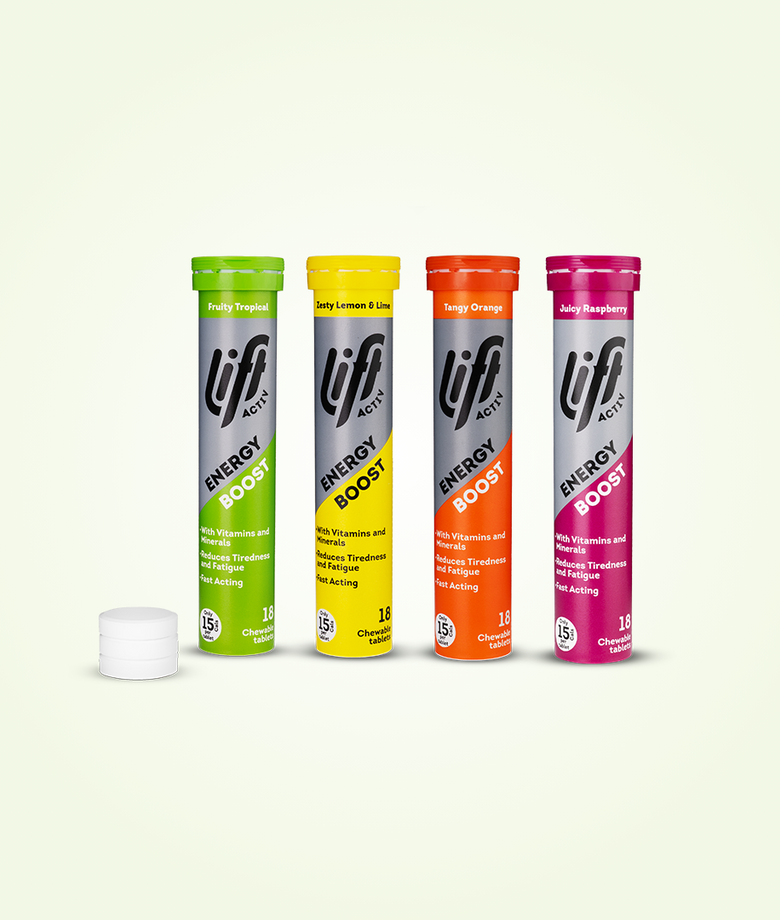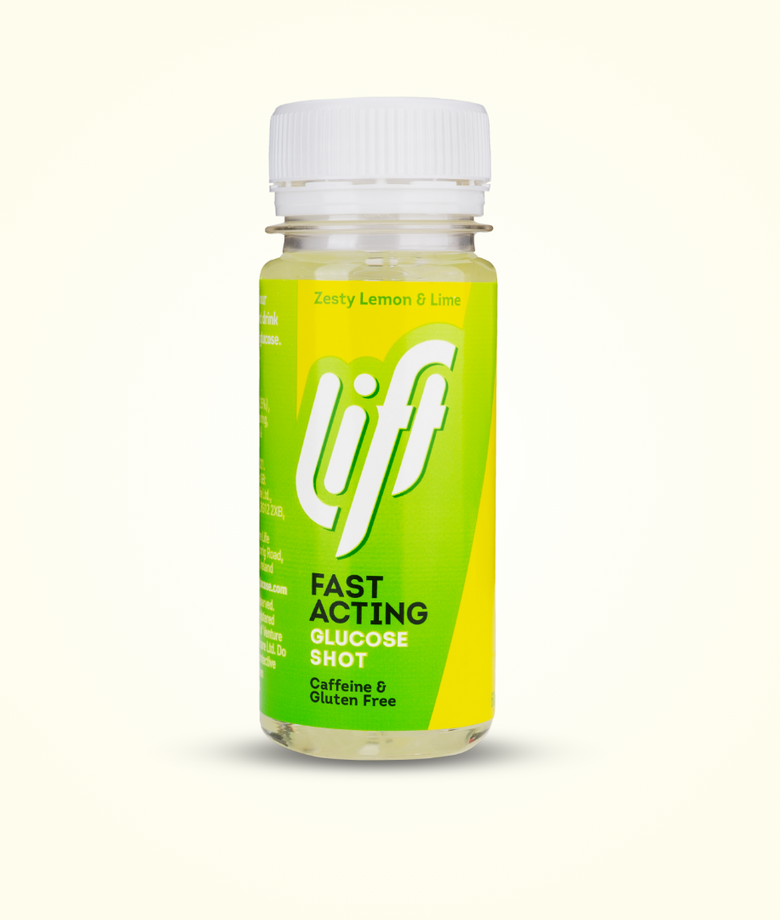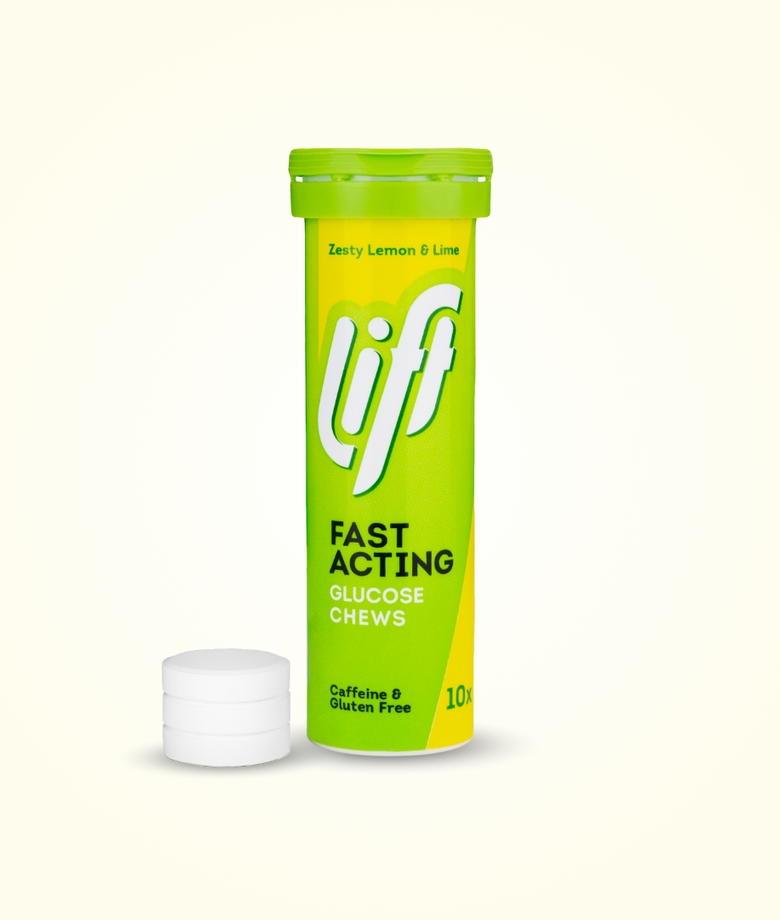8 Benefits of Glucose Tablets for Athletes
Glucose tablets were initially developed to help people with diabetes supplement their blood sugar, but because all bodies rely on glucose for energy production, there are no restrictions on who can use them. For sports players, bodybuilders and endurance athletes, glucose supplements can support performance and recovery.
What is glucose?
Glucose is a monosaccharide or simple sugar. It is the simplest form of sugar and is normally gained from the digestion of carbohydrates.
For cells to generate energy, they need a supply of glucose. This is either gained from glucose in the bloodstream (blood sugar) or glucose developed from glycogen stores in the muscles or liver.
During aerobic respiration:
Glucose + Oxygen → Energy + Heat + Carbon Dioxide.
This is the energy used by all of our cells to perform metabolic and biological functions and powers muscle cells during physical exercise. Energy is also needed to repair muscles and maintain mental function.
When we run low on glucose, our muscle cells can not keep going, no matter how hard we push ourselves. This is known among athletes as ‘hitting the wall’.
What kinds of Athletes take Glucose Tablets?
Anyone training for endurance or stamina uses a lot of energy. To get through that wall when your cells run out of glucose, a supplement such as glucose tablets is a useful tool. Glucose tablets are used by endurance athletes including:
- Marathon runners
- Bodybuilders
- Long-distance cyclists
- Rowers
It is generally agreed that taking glucose is not necessary during every workout, only long and intense sessions. Your body stores excess glucose as glycogen in muscles and the liver. Taking in more glucose than needed can lead to hyperglycemia (high blood sugar).
Benefits of Glucose for Athletes
There’s much to celebrate about the availability of affordable, accessible glucose juice shots and tablets. If you’re a trainer or athlete, here are some advantages to consider.
1. Quick restoration of Glucose
The main function of glucose supplements is to resupply your blood sugar to its normal level. During a long-distance race like a marathon, glucose tablets can provide the glucose required for energy production without the need for digestion or heavy carbohydrates. Glucose is shown to raise blood sugar in as little as 15 minutes, helping athletes continue without suffering low blood sugar.
2. Delaying fatigue
When blood sugar runs low during a race or heavy exercise session, fatigue can overtake our willpower and make it impossible to continue. This is because there simply isn’t enough left to make energy from. Fatigue impacts both the muscles and the brain, and can be delayed by taking glucose tablets at set times. For example, if you know that you can run for 10km before fatigue starts to slow you down, taking a glucose supplement at 9km can give you energy for the extra push.
3. Rapid glycogen replenishment
Glycogen is the substance that excess glucose is converted into for storage in the muscles and liver. During exercise, your muscle cells recall glucose from the glycogen to use in energy production. This is why muscles can ‘hit a wall’ and it can become impossible to keep pushing. Normally, the body can take around 24 hours to replenish these stores through food digestion. To replenish glycogen stores during an intense training period, glucose supplements can offer a quick and effective solution and avoid depleting glycogen stores.
4. Precise dosing
Glucose tabs contain an exact amount of glucose, which means athletes can experiment during training to calculate the right amount to help them through endurance sports such as marathon running. While eating a high volume of carbohydrates before a race is a good practice, it does not provide repeatable results as the amount of glucose gained may vary. Lift Glucose chews contain 3.7g of glucose and 15 calories per tablet, while Lift Glucose juice shots contain 15g of glucose and 57 calories.
5. Avoiding digestive problems
When using energy drinks or gels, some athletes experience discomfort. For example, running with a stomach full of fluid can be unpleasant and even painful. With glucose tablets, this issue is easily avoided as the tablets dissolve immediately in the stomach.
6. Sustain mental focus
It isn’t just the muscles that are affected by fatigue. Endurance sports are mentally and physically challenging, and remaining psychologically positive can be difficult when blood sugar is low. Chewable glucose tablets can help bring you back to peak mental performance as well as physical.
7. Supports Muscle Recovery
According to a 2012 study, glucose is required for muscles to repair themselves after intense workouts. While protein is also an important part of this process, glucose provides the energy for muscle recovery. The study found that the sooner glucose is in your bloodstream after a workout, the sooner muscles begin repairing themselves. As carbohydrates can take a long time to break down, using glucose tablets alongside protein supplements can speed up your recovery and you grow stronger.
8. Convenient and portable
Carbohydrates such as rice, potatoes or bread are difficult to carry around on a run. If you’re feeling fatigued but need to keep pushing, it’s much more convenient to have a glucose shot or glucose tablet for athletes to replenish their blood sugar. In a tough, resealable plastic case, Lift glucose tablets can fit easily inside your gym bag for quick and easy access.
Glucose for Athletes: When is it Safe?
When taking glucose for sports, it’s important to consider your health and whether it’s something that will really help. Supplements are available as a support to sporting endeavours and should be used carefully and systematically.
If you are exercising consistently for long periods, taking glucose can help delay physical and mental fatigue, without the digestive trouble some experience when using energy drinks. A precise dose enables you and your trainer to plan glucose intake to the greatest advantage, and taking glucose after an intense workout can aid muscle repair and replenish glycogen stores.






